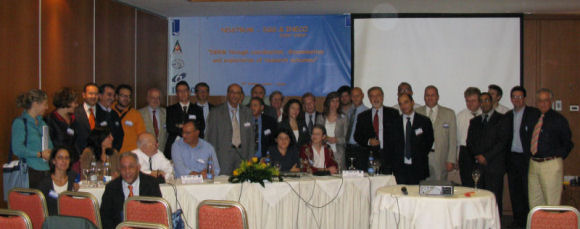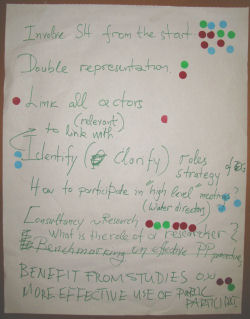|
In this issue:
The Cyprus INECO and Nostrum-DSS Joint Event:
IWRM through coordination, dissemination and
exploitation of research outcomes
Egypt: Meeting local residents in Basandeila
Syria: Discussing with authorities on the pollution of the
Barada River
Lebanon:
Unveiling conflicts & perceptions on water stress in the
Damour River Basin
Cyprus: Citizen proposals for the protection of the Pegeia Aquifer
The 2nd semester Deliverables of INECO
Future project events
The INECO Consortium |
The Nostrum-DSS and INECO Joint Event
on
“IWRM through coordination, dissemination, and
exploitation of research outcomes“
|
|
Background |
|
|
A recent review of EC-supported
research depicted that
projects tend to place more
emphasis on the environmental,
societal and economic impacts of
research, and that integration
of science and research with
policy priorities is an
objective that is being
increasingly pursued. However,
the uptake of research results
remains unsatisfactory, for
several reasons including the
inefficient communication
between the science and policy
spheres.
Various efforts have been or are
being pursued, including the development of a
knowledge base on tangible water
management problems, the
implementation of the
Euro-Mediterranean partnership
and attempts to establish two-way
feedback for the dissemination
of experiences and outputs.
Furthermore, the enhanced
opportunities for interaction
and cooperation between the EU
and third countries research
teams has contributed to the
development of new approaches
and perspectives in water policy
and policy-relevant water
science.
|
However, it is broadly acknowledged there are still problem areas, where action
should be sought and
implemented:
-
Fragmentation in research activities,
as many different programmes and projects with
similar or interrelated
objectives are implemented but
with limited possibility to
interact and exchange and/or integrate outputs.
-
Limited effectiveness in the
dissemination of research results towards
stakeholders and the general public both during and
after project implementation.
-
Limited exploitation of
research results, due to the small duration of
project activities (limited time for impact vs. time
required for the integration of outcomes in policies)
and the inherent difficulty in reaching the intended
end-user.
|
The Nostrum-DSS
and INECO Joint Event |
|
An initiative for addressing the
above issues and concerns was
undertaken by the Nostrum-DSS
and INECO projects, through the
organization of a Joint Event
specifically aimed at
identifying common strategies
for strengthening the impact of
research, by offering concrete
ideas and suggestions on how to
address the aforementioned three
problem areas.
|
This Joint Event was organized in Larnaka,
Cyprus on October 25th 2007. It was attended by
a total of 54 participants, including representatives of 9 EC-funded projects focused on water
management in the Mediterranean Basin (GEWAMED, INECO, WASAMED,
MEDROPLAN, MEDITATE, MELIA, ISIIMM, DIMAS, Nostrum-DSS), European Commission and EU Water Initiative representatives and invited experts.
|
|

The Joint Event Participants |
|
The event was divided in three sessions:
- During the morning session, brief
presentations were made by the participating projects on their experiences,
approaches and views on the dissemination, coordination and exploitation of
research outcomes.
- The second session was dedicated to contributions from panel
experts on opportunities offered and problems frequently encountered.
- Finally, the afternoon Workshop aimed at the synthesis of views through
group discussions, and the preparation of
contributions for the final conclusions.

The Afternoon Workshop
voting session
Material available for download:
- Event executive
summary
- Event report
-
Event presentations
|
In summary, the recommendations drawn from the event were the
following:
-
The fragmentation and communication problems of research
activities can be addressed by actions that support interaction
and integration among projects and results, including the
establishment of voluntary clusters, the organization of joint
international events, strategic collaboration with different
bodies, and the setting-up of follow-up activities.
-
The successful integration of
research and policy and the dissemination of project
results requires adapting to the local context.
Collaboration with local stakeholders is an objective
that should be pursued from the very beginning and to
which significant resources should be devoted.
-
Successful dissemination lies in
the use of different dissemination means for different
audiences, and in addressing the audience in an
effective, simplified and comprehensive way.
-
The efficient and effective
exploitation of research results from projects should be
fostered by follow-up activities, through specifically
targeted research projects (local and international),
regional exchange networks, establishment of links with
EU frameworks and political initiatives (e.g. the
MED-EUWI), and other political organizations active in
the Mediterranean area (e.g. the Coordination Unit of
UNEP/MAP).
|
|

|
|
